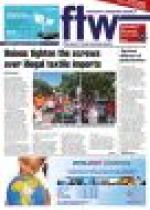The Southern African
Clothing and Textile
Workers’ Union (Sactwu)
has “pressed pause” on its
planned nationwide protests
against illegal clothing,
textile, footwear and leather
(CTFL) imports – giving
the South African Revenue
Service (Sars) leadership
a chance to meet with its
representatives next month
and agree on “concrete and
urgent solutions”.
Andre Kriel, general
secretary at the Cosatualigned
union, told FTW
that following its protest
march to Sars head office
in Pretoria earlier this
month (March 10), Sactwu
was planning to conduct a
further 18 protests at Sars
regional and branch offices
as well as at ports and other
entry points. “But now we
have the meeting on April
12,” he said.
Kriel said the union had
been in talks with Sars for 18
months, but that at quarterly
industry forum meetings the
revenue authority’s resolve
to fight the scourge of illegal
imports seemed to have
collapsed.
Sactwu researcher Simon
Eppel pointed to statistics
that seemingly illustrated
that the Sars campaign had
ceased to yield satisfactory
results. “Eight years ago,
Sars started a serious
campaign to combat illegal
imports in this sector. In
the first four years of the
campaign, the authority
confiscated more than R1.9
billion worth of illegally
imported goods in the CTFL
sector – about R485 million
per year.”
In the last three years,
however, Sars annual reports
indicated that it had only
seized R106 million worth of
CTFL goods – around R35
million a year, said Eppel.
“In the 2015/2016 financial
year we saw the nearcollapse
of this campaign
with only R8.7 million worth
of goods confiscated.”
Furthermore, he said, in
2014 about 40 to 50 samples
of suspicious clothing had
been sent to industry experts
each month. According to
Eppel, this dropped to an
average of 30 per month in
2015 and plummeted to an
average of two per month in
2016.
He estimates that South
Africa loses about R4 billion
a year in import duties
due to illicit imports. “If
these duties were collected,
they could have built
infrastructure or helped
manufacturing,” he said.
Kriel added that the Sars
customs fraud campaign
was a key part of the
government’s drive to
reindustrialise the country.
“If Sars does not do its job
properly, it undermines
everything else done to build
and grow industries and
factories,” he said.
Industrial Development
Corporation (IDC)
spokesperson, Mandla
Mpangase, agreed that
illegal and under-invoiced
imports remained a major
threat to the industry.
“The IDC welcomes the
interaction between
Sars and the industry,
as well as the resultant
recommendations to address
this challenge,” he said.
A Sars spokesperson
said the revenue authority
was committed to working
closely with industry
stakeholders, including
Sactwu, to seek new
solutions. “We are in the
process of reviewing and
modernising existing
customs and tax regulations
and the licensing of trading
entities and are looking at
a more effective penalty
regime to deter noncompliance,”
he said.
Sactwu has called on Sars
to, amongst others, increase
raids on internal customs
hotspots; implement
dedicated ports of entry for
CTFL goods; and fast-track
the implementation of the
new Customs Control and
Customs Duty Acts which
contain several provisions
to assist it in dealing more
effectively with customs
fraud.
CAPTION
The Sactwu march to Pretoria earlier this month, highlighting the number of jobs lost due to
illegal textile imports.
Unions tighten the screws over illegal textile imports
31 Mar 2017 - by Adele Mackenzie
0 Comments
FTW - 31 Mar 2017

31 Mar 2017
31 Mar 2017
31 Mar 2017
31 Mar 2017
31 Mar 2017
31 Mar 2017
31 Mar 2017
31 Mar 2017
31 Mar 2017
Border Beat
Featured Jobs
New
New
New
New
